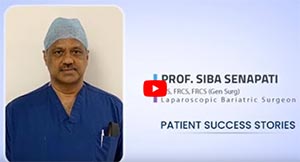FAQs
Prof Senapati has done more than 1000 various bariatric surgical procedures and has never had to convert them. Pain is minimal, postoperative recovery is quick with early discharge from the hospital. Majority of the patients were discharged the day after surgery, whether they had sleeve gastrectomy, gastric bypass, gastric banding or revisional bariatric surgery. In a small proportion of cases, patients may stay a little longer. usually a day or two more so that they are comfortable, fully mobile and tolerating liquids well.
Your surgeon will determine and explain what you need to do before having obesity surgery, but these are answers to some of the more common questions regarding tests and procedures you may be asked to do in preparation for your surgery.
What are the routine tests before weight-loss surgery?
After initial consultation, depending upon your health status and associated conditions/diseases, a few tests may be done if they help to assist in the surgery you will undergo. Please bring all the information your GP has provided with you and any relevant past medical history, which may be helpful for your surgeon. If the decision has been made to proceed with surgery, you will be seen by the specialist bariatric nurse and our specialist bariatric dieticians for further evaluation, following which you will have a preoperative assessment for surgery and appropriate relevant investigations carried out.
What is the purpose of a preoperative assessment?
This is to assess your general fitness and identify any conditions which may not have been investigated or looked into before, such as diabetes is not known in 50% of patients before surgery as a quarter of the patients with obesity have diabetes. Sleep apnea may not have been diagnosed which may be prevalent with obesity, we do a scoring system in clinic and at your preoperative assessment, so that sleep studies if required are carried out if you scoring is high.
Will I see a specialist bariatric nurse and dietician?
Yes, after your initial consultation, if the decision is made to proceed with surgery you will see one of our specialist bariatric nurses and a specialist bariatric dietician. This support will continue for two years after surgery, so that your recovery and follow-up after surgery is very closely managed by our specialist team.
Will I have more tests before surgery?
Depending on your current symptoms and past medical history, such as previous surgery, some tests may be carried out which will be discussed at length during your consultation.
What can I do before the appointment before obesity surgery consultation?
Please bring any information with you from your general practitioner or specialist consultant if you gave been seen previously. Please do bring a list of your medications if you are on any.
Does laparoscopic surgery decrease the risk?
Yes, currently Prof performs all his primary and revisionary bariatric surgery laparoscopically and so far he has not converted to an open procedure. Laparoscopic surgery helps in quicker recovery and you will experience less discomfort, shorter hospital stay, earlier return to work, reduced scarring. Laparoscopic surgery also avoids the delayed complications of open surgery, such as an incisional hernia or bowel obstruction.
Will I have a lot of pain?
Pain is variable after laparoscopic surgery, but usually every effort is made to control pain after surgery and this helps to avoid any problems and speeds up the recovery. Often several drugs are used together to help manage your post-surgery pain.
How long do I have to stay in hospital?
It takes as long as it takes to make you comfortable, safe and mobile. Most patients stay in hospital for a day or two, however if you need more time to recover from your surgery you will stay longer, but our whole team will ensure that you will be discharged once you are comfortable, safe and happy to go home.
How soon will I be able to walk?
Almost immediately after surgery, doctors will require you to get up and move about. Patients are asked to walk or stand at the bedside on the night of surgery, take several walks the next day and thereafter. Prior to being discharged you will be seen by our specialist bariatric nurse and physiotherapist to ensure you are safe to return to home. On leaving the hospital, you may be able to care for all your personal needs, however you will need help with shopping, lifting and transportation. In addition to prof, you will see our specialist bariatric nurse and physiotherapist to ensure you our able to go home.
How soon can I drive?
Usually after a week or two following surgery, when you are reasonably comfortable, taking minimal painkillers and all the wounds have visibly healed.
What is done to minimize risk of DVT/PE?
Because of the slightly higher risk of DVT/PE following lap bariatric surgery, there is care taken during and after surgery including the use of compression stockings and blood thinners. Both these therapies will continue throughout your inpatient stay and also for a week after surgery. If required, they may continue for up to 3-4 weeks if you have had previous DVT/PE or you can resume your previous blood thinners, usually after the first 3-4 days. Of course the dose of your blood thinners such as Warfarin, may have to be altered depending upon your INR, which can be monitored at your anticoagulation clinic.
What should I bring with me to the hospital?
Personal toiletries and clothing for your stay that are easy to put on and take off.


